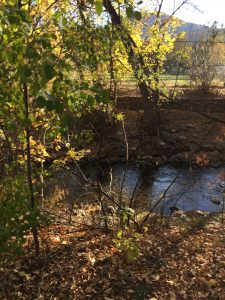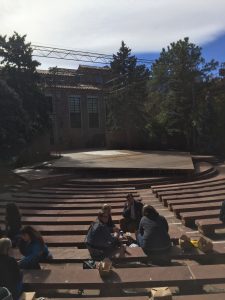I arrived home today to find Philip John Usher’s wonderfully detailed recap of our event at Boulder this past weekend. It’s great, and frees me up for some more speculative and personal thoughts on a blazing trip to the Rocky Mountains. I scratched out most of this while on an eastbound plane this morning —
“Critique is care,” quipped the sagacious Anne Harris near the end of our 60+ hour hothouse conference this weekend at the U of Colorado at Boulder. Our fearless leader Scott Bruce instantly proposed collective tattoos. The leap from intellectual practice to arts of the body caught the spirit of our weekend exactly right. I miss Boulder already!
I won’t attempt to taxonomize the weekend’s nearly two dozen talks, because Philip already has and because that Herculean labor already fell to one of our fellows, the distinguished economic and environmental historian of the Middle Ages, Richard Hoffman. In blog-synthesizing some scattered thoughts about the conference, I’m responding to Rich’s generous closing reflections, in particular his grappling with the plural methodologies, archives, and styles that our crew of historians, art historians, and literary scholars tossed into our shared ring. My abiding sense of this great weekend comprises wrestling with difference and diverse methods in Colorado. In the face of rapid and painful ecological change, we offered different things.
A few keywords, assembled over the weekend:
adaptation
resilience
management (mainly used of forests, sometimes of fisheries)
scale
urbanization
entanglement
defraction
exchange
Miri Rubin started us off on Th evening with a gorgeous iteration of the James Field Willard Lecture in Medieval History, exploring urbanization and its cultural expressions. Her implicit engagement with the environmental humanities ensured that urbanization would become one of the forcing pressures spanning our nearly millennia long chronology for the rest of the weekend. Miri’s fireball curiosity and vast appetite for knowledge surged through the conference: she in fact treated Anne and me to a private second-breakfast plenary on religious art in the hotel restaurant around 7 am Sat morning, as well as (I believe) inhaling articles by assorted panelists during the coffee breaks. The joy and at times exhaustion of conferences like these consists of discovering new people and new ideas. Miri’s voracity was inspiring. She also shares my appetite for electoral minutiae in this anxious political season, which made for a lively backchannel. There is so much fear of change in our politics and environmental cultures, and so much need for bravery and humor.
For years I’ve been treating the Columbian Exchange as an ecophysical model for premodern cultural disruption, so it was wonderfully welcome for me to hear Paolo Squatriti’s searching plenary on weeds, agriculture, and what he calls the “Mediterranean Exchange,” in the context of Islamic expansion after the 7th century. The bumper-sticker slogan I promoted the next morning, “Pluralize the Anthropocene!” was still a day away when I heard Paolo’s talk on Fri, and as with so many of the weekend’s contributions I wished I could have integrated it into my thinking before my turn came around.
Flying home on Sunday on just a few post-microbrew hours of sleep, the panels swim in my sleepy imagination as enticing schools of French forests, watermills, Icelandic annals, Anglo-Saxon cosmologies, mines, trees, stones, cloisters, and many other strange and wonderful things. Infinite riches in a little room, as the doomed poet says.
Anne Harris, whose recent turn to upper administration at DePauw is bringing light to the dark side, gathered us together after a long and intense day on Fri with a wonderfully intricate talk on the “entanglement” of stone and will in polytemporal Brittany. Weaving together Neolithic standing stones assembled at Carnac and Monteneuf with two separate “fellings” of the Montneuf stones by medieval Christians around 700 and 1000, the re-standing of the stones by the French tourist office since the 1970s, and her recent wintertime visit there with her lucky students, Anne narrated a moving and beautiful tale of exchange and affective response. Stone entangles human wills and feelings.
Like my Hamlet-izing the next morning, Anne’s talk wasn’t argument in an experimental or testable sense, though it was deeply persuasive. There are things humanities scholarship does by layering narrative into persuasion. This sort of storifying is not a new development, and also not limited to interpretive fields like literary studies or Art History, as brilliant historians like Natalie Zemon Davis and Carlo Ginzberg have long since shown. The pluralizing project of humanist inquiry requires both story and argument, facts and feelings — and also theories, numbers, data sets, and images, not to mention poems, plays, and pictures.
I felt a bit out of place the next morning with my very literary reading of hyper-familiar Hamlet, amid the blazing variety of new discoveries. But I think there remains a place for re-firing the old canon, because out of the prince of Denmark’s famliar words and actions changes still appear. Even our Deadest Whitest Baldest Male Authors can perhaps help Pluralize the Anthropocene in our dissolving present.
I’ll offer one last strange thing that’s echoing for me after this weekend’s head-spinning events. At an interdisciplinary event such as this one, at which I was the lone literary scholar among the plenary quartet, it’s hard not to feel as if personal affinities somehow allegorize intellectual alliances. (Another bumper sticker from a previous Western event: Always allegorize!) To some extent, Rich Hoffman and I represented deeply dissimilar approaches and methods this weekend: economic history v literary interpretation, facts v plays, positivism v theory. But we also, strangely and wonderfully, share a personal history with the same obscure body of salt water. In the late 1960s, when I was a mewling infant on the suburban plains of New Jersey, Rich was a grad student at Yale, living in the Short Beach neighborhood of Branford near the mouth of the Farm River and Long Island Sound. Decades later, at the millennium’s turn, I moved into the same neighborhood to raise my own babies near the warm salt waters of Short Beach. Our respective houses were maybe 1/3 mile apart; I walked my dogs up toward Rich’s old place today, after I got home. Environmental humanists connected by an environment!
I’m thinking now about grad student Rich flashing his lure into the silty bay where I swim every day in the summer. I’ve taken some fish out of those waters too, albeit fewer now that my son is a teenager with better things to do than fish with Dad. Living near water, which has come to indicate economic privilege in the modern world and may also become a site of precarity in the stormy Anthropocene, marks us both. We respond, in our different ways, to water’s inhuman pressures and entanglements.
I look forward to extending and complicating the conversations of this past weekend in the mountains! Special thanks to Scott Bruce and Anne Lester for welcoming us into their vibrant community



Leave a Reply